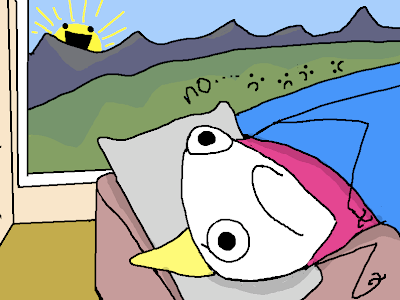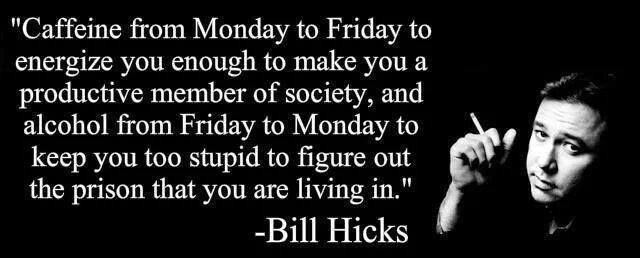*This will be a challenge to write because I've always fairly quickly dismissed others that try to summarise what it is to be depressed. Whether they're down because their cat died, or drink too much on the weekends... I get frustrated by the comparisons to my own struggle. I also do not wish for this to be an overly depressing post :P
If there's one thing I can suggest before bogging you down with my writing, it's that you read Hyperbole and a Half: Adventures in Depression. It is by far the most hilarious, intelligent insight into depression that I've ever come across.

The above picture is from Hyperbole and a Half.
I believe I first started to exhibit signs of depression and anxiety when I was 10. I recall hearing that children first start to become truly aware of the world and how it is at around that age, and that it is around the age of 10 that children can be charged with a criminal offense. I'm unsure if it was biological or related to rather harsh events I had experienced at around that time. Probably a little of both.
At around this time I started to get anxiety in the classroom. I couldn't sit in class without feeling the need to go to the toilet constantly. I developed this fear that I'd wet myself in the classroom. I've since worked out why I developed this anxiety and conquered that fear (took 10 years), but I'll avoid going into that detail for now. I also started to literally see the world in a different light. On sunny days it was particularly evident, and my father later best described it as like constantly looking through a glass window. For me, I felt it was more of a plastic sheet... glass is too clear. The analogy though has to do with not really feeling like you're connected to the environment you find yourself in. The perfect example is of imagining a perfectly sunny day where families are out in the park having picnics and you're completely incapable of understanding/feeling/tapping into that apparent joy for life everyone else around you seems to exhibit. This continues to be a problem for me to this day, but I've come to better understand and deal with it.
At around the age of 13 my dad felt that I might be depressed and so took me to the doctor. Surely enough I was diagnosed with "major depression/anxiety", but.. hell, everyone gets diagnosed with that these days. For the next 10 years I took all kinds of different medications which I think for the most part failed to help at all. Xanax (anti-anxiety drug) certainly helped, but was also rather dangerous and addictive. Seroquel I felt also helped, but I stopped taking that due to a fear of tardive dyskinesia. I'm not going to say that medication isn't in some cases absolutely necessary, but I don't think it's ideal and for the most part not healthy. For about a year all that went through my head was this lingering suggestion that I shove my neck onto the train tracks in order to decapitate myself. During that time I was strongly medicated with antipsychotics which really kept me from doing much at all, and to that extent I feel that I was in some way saved by them.
I've since come to realise that for me there's a better way to look at depression. I believe that "depression" is really just an allergic reaction to our modern, corrupt world. Maybe depression is my instincts kicking in, telling me that the world in which I find myself in isn't to be trusted... that something isn't right? It's my fight or flight system discombobulated due to my conscious desire to integrate into a world which is clearly sick.
What if at 13 I was told by my psychiatrist that what I'm feeling is perfectly normal given the circumstances, and that whilst he could give me a pill, he would like to help me come to terms with the world in which I'm going to have to face? I feel that in many cases prescribing medication is counterproductive, confirming to the patient that there is something wrong with them rather than helping them come to understand that reality is simply a cruel mistress.
At one point I had some sessions with my school counselor. She suggested that every day when I wake up I look into the mirror and smile, telling myself that I'm a good person worthy of happiness and success. I felt this advice was lousy and never attempted such. In fact, in order to rebel against that advice I made my email password a negative slur on my character (eg. youareawanker)
Over the years the general suggestions from doctors (on treating depression) had been basically to look after my overall health, making sure to avoid alcohol and cigarettes while maintaining fitness. This advice seemed pathetic at first, and I would tell myself that my problem is psychological (not physical). In time though I've come to realise their advice was the best medicine. I initially became an addict to the endorphins from long distance running, and later found that yoga (I'm not some spiritual hippie) and gym work also helps as much with that chase for a natural high. In recent years I've also come to realise that certain foods really alter my moods (look up gut-brain-microbiome axis), and that alcohol is to be avoided at all costs. Again, I don't like to think of myself as a health freak... but if you think about it, it makes perfect sense that if your body is out of whack, your mind will be too. I'm 32 now and have only just realised I have an allergy to lactose which causes me to get an extremely dry mouth at night. How much might this have caused my moods to be altered? What I'm trying to say is that I don't think it's as simple as having some chemical imbalance in the brain!
On the worst of days I tend to naturally isolate myself. I stay indoors and distract as much as possible with movies or the computer screen. This I find though is the worst thing I can do. As hard as it is, if I force myself out to go for a hike in the mountains or a stroll along the beach I find that I'm far better off. It's easier said than done though.
Depression to me is questioning my hormones when a naked woman is lying in front of me, while simultaneously questioning why I'm questioning my hormones at such a time! It's being unable to enjoy a night out because that ocean of smiles and happiness seems absurdly fake.
What helps is knowing that everyone has their own struggle in life. That while to you it may seem that their struggles are trivial, your own struggles are trivial to some child in Bangladesh who hasn't had a meal in four days. It may seem like everyone is happy around you. In the media all we seem to be exposed to is examples of "success", brainwashed into thinking that if we're not living our lives a certain way we're not really living at all. I think for the most part people desperately attempt to hide their misery and confusion, and try their best to "fit in". This leads to this surreal, false atmosphere which creates the conditions for the depression that we face. If more of us told the truth when asked "how are you?", we'd all perhaps be able to find comfort in knowing we're not alone. As it is, people will do anything to avoid revealing their struggles, promoting only the "success" in their life over social media and in their interactions with others.
I work in aged care helping those that are simply facing a reality far more horrific and depressing than my own. It's psychologically the best work I've ever had. In helping others you forget your own troubles. I'd suggest that everyone do some kind of charity work, or something that makes them feel that they're giving back to the community. It makes you feel that your life is worth living, that you're needed and a worthy member of the community. I hope that this hasn't been too taxing to read :)
I'll add some links and quotes over time as I remember them. Ask yourself how you might feel interacting/participating within a dystopian/orwellian society, then realise that you're already there. If you can acknowledge that, then you can start to realise the problem isn't with you but everything around you (what are the chances hey! :P). I think the series that catches the feeling of how the world has become, and where it seems to be heading is called Black Mirror. I highly recommend it!

Bill Burr's podcast is fantastic, but considering the sheer volume of episodes I find it's best to listen to his "advice" section only. This can be found on youtube by searching "Bill Burr - Advice". It's particularly good to listen to if you're a male coming out of a nasty break up.

"I believe that "depression" is really just an allergic reaction to our modern, corrupt world."
I've recently come to a similar conclusion as well.
It started at age 15 for me, but my panic attacks are more of a problem than my depression.
Thanks so much for sharing your story.
Many blessings to you.
Thanks for your comment! I started to realise that my problem was with our culture when I traveled to Japan. For me, I'd always avoided travel because I had assumed it would send my anxiety into overdrive. I've spent a fair amount of time over there and never once had the slightest bit of trouble. I felt at home. The people seemed to be less corrupted by western culture. You wouldn't walk into bikies or.. people that were overcompensating for insecurities. There was no graffiti or littering, no young men doing burnouts in cars or revving their engines to impress girls. Over there, they realise that doing such is moronic. My culture shock has always been in coming back to Australia. I say all this while taking into account my bias for a "grass is greener" kind of attitude, but I'm absolutely convinced I'd have been better off raised in Japan.
I remember those panic attacks.. heightened senses, walking through crowds assuming everyone is looking at you thinking you're a freak! The sweating, the failure to breathe.. the strong urge to escape no matter what. On the bus, in the car, in shopping malls and cinemas.
That's interesting about Japan. I'm in the US which is likely worse than Australia!
Feeling trapped is the worst part of the panic attacks. You can escape a bad situation, but you can't escape yourself.